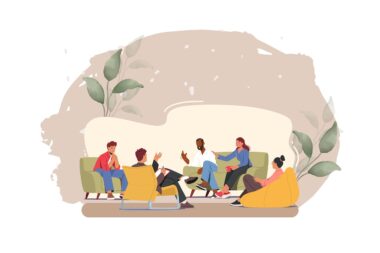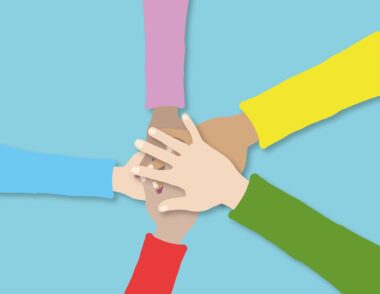Navigating Eating Disorders: When to Seek Support Group Help
Eating disorders affect millions of individuals, and their impact can be profound. When facing these challenges, the question arises: When is the right time to seek help through a support group? Many people hesitate to reach out or join groups, thinking they can manage their struggles alone. However, recognizing that professional assistance is often crucial is vital. Support groups offer a safe space for individuals to share their experiences and feelings with others who genuinely understand their circumstances. These gatherings encourage open communication about food, body image, and self-esteem. Participants often form strong bonds, which aids in the recovery journey. Engaging with others facing similar issues decreases the sense of isolation that often accompanies eating disorders. Furthermore, support groups provide a wealth of knowledge about coping strategies and emotional resilience. It is essential to consider that waiting too long to seek support can lead to worsening health. Ultimately, if one feels overwhelmed by their eating habits or body image, finding a local support group could be the critical first step towards healing.
To determine the best time to seek help, individuals must assess their feelings and behaviors. If food becomes a significant source of stress or anxiety, it’s time to reflect on the situation. Signs that indicate a need for assistance may include restrictive eating habits, constant calorie counting, or episodes of binge eating. Additionally, if body positivity becomes unattainable or if self-worth is solely tied to weight, these are signals that support may be beneficial. It is also critical to notice if one’s physical health is impacted, such as weight fluctuations or health issues related to eating habits. Engaging with a support group helps establish accountability and motivation. In such environments, members can share strategies for coping with urges while also discussing underlying emotional triggers. The collective experience in these groups provides reassurance that recovery is possible. Many participants find strength in hearing others’ stories, which can provide hope for their journey. Thus, awareness of one’s mental state and readiness to improve is vital in deciding when to seek group support.
The Role of Support Groups in Recovery
Support groups play a crucial role in the recovery process for those dealing with eating disorders. They provide a sense of community and belonging to individuals who may feel isolated or misunderstood. In these settings, sharing experiences can alleviate guilt and shame often associated with eating disorders. Participants can express feelings of inadequate body image and learn that others have struggled similarly. This shared experience fosters an environment of empathy and understanding. Moreover, many groups are facilitated by trained professionals, offering structure and guidance in discussions. Members can explore coping mechanisms together, aiding individual recovery journeys. It is motivating to witness others recover and hear their success stories. Additionally, support groups can introduce new resources and important coping tools, such as mindfulness techniques and nutritional knowledge. Often, groups will invite special guest speakers, including nutritionists or mental health professionals, to enhance members’ understanding. Engaging with a support group is an opportunity not only for self-reflection but also for communal healing, as individuals work towards healthier relationships with food and their bodies.
One of the significant benefits of support groups is that they are often tailored to specific types of eating disorders. For example, there are groups specifically for those struggling with binge eating disorder, anorexia nervosa, or bulimia nervosa. This targeted approach allows for more relevant discussions, as members can share experiences that align closely with their challenges. Moreover, it creates a space for people to learn from one another’s coping strategies effectively. Individuals who participate in these specialized groups often express feeling seen and understood for who they are. In addition to addressing specific disorders, many groups focus on younger or older demographics. This person-specific focus can provide tailored advice relevant to the individual’s situation and life experiences. Additionally, the diversity of participants enriches conversations and insights. Encouraging open dialogue about feelings, and mental health promotes healing in members. Subsequently, individuals may leave each meeting with a greater understanding of both their struggles and the potential paths toward recovery. This specialized focus in support groups amplifies the healing potential for all participants.
How to Find a Support Group
Finding the right support group is an essential step in the recovery journey. There are numerous resources available for locating local or online groups. Many organizations, such as the National Eating Disorders Association, offer listings of accredited support groups by region. Local health clinics and hospitals often have information on community-based support options. Online platforms can also provide broader access to virtual support groups, accommodating those who may not have local options. Social media has become an effective tool for individuals looking to connect with support groups. Numerous groups exist on platforms like Facebook or Instagram, allowing for both anonymity and comfort. Prospective members might consider attending multiple groups to find the right fit, as the dynamics can differ. It’s crucial to feel comfortable and safe in the chosen group to foster open discussions. Moreover, it’s perfectly acceptable to seek out groups specifically matching personal needs, such as age, gender, or particular eating disorders. Finding the right group takes time but is incredibly important for fostering a supportive environment.
In addition to finding the right group, it’s important to prepare mentally for participation. Initial attendance can be daunting, and feelings of embarrassment or apprehension are entirely normal. Recognizing and accepting these feelings is a valuable part of the process. Individuals may consider writing down their feelings or expectations before attending to better express themselves when they arrive. Many support groups also have structured formats which help guide discussions, making initial participation easier. It may take time to participate fully, so patience with oneself is paramount. Listening can also be immensely beneficial, as absorbing others’ stories can provide comfort and insight. Over time, as trust develops, sharing becomes more comfortable. Every person in the group is on their journey, and every story differs. Individuals will likely find solace in the recognition that everyone is working toward recovery. As participation grows, so can the sense of community. Thus, preparing mentally for group participation encourages a more successful experience, leading to lasting healing and emotional support.
Conclusion: Taking the First Step
Ultimately, the journey toward recovery from an eating disorder can be challenging, but seeking help is a vital part of the process. Support groups provide invaluable networks of understanding and encouragement essential to overcoming these challenges. Individuals must recognize the signs that it’s time to reach out for assistance. Taking the first step can feel insurmountable, yet it can lead to healthier habits and improved self-esteem. Joining a support group can help individuals craft lasting relationships and gain crucial coping skills, enhancing their overall journey toward recovery. Through the shared experiences of others in the group, individuals can learn about different recovery paths, finding inspiration in the successes of others. Remember, the process can take time and may require trying multiple groups before finding the best fit. The courage to ask for help reflects strength, as it acknowledges the need for communal support. The decision to reach out and connect can profoundly transform one’s relationship with food and self-image. By taking that first step, individuals open the door to lasting change and a healthier life.
For additional resources, individuals can visit reputable websites focused on eating disorders, mental health, and recovery strategies. Many offer valuable information about local and online support options to guide individuals through their journey.





